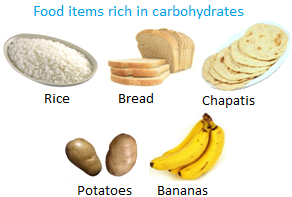The human body requires a constant supply of energy to perform its daily functions. Carbohydrates are a vital source of energy and play a crucial role in maintaining overall well-being. In this article, we will explore the importance of carbohydrates for energy and discuss how they contribute to our body’s functions.
What are Carbohydrates?
Carbohydrates are one of the three main macronutrients alongside proteins and fats. They are organic compounds consisting of carbon, hydrogen, and oxygen atoms. Carbohydrates can be broadly classified into three categories: sugars, starches, and fibers. Sugars are simple carbohydrates, while starches and fibers are complex carbohydrates.
The Role of Carbohydrates in Providing Energy
Carbohydrates are the primary source of energy for the human body. When consumed, carbohydrates are broken down into glucose, a simple sugar, during the process of digestion. Glucose is then absorbed into the bloodstream and transported to cells throughout the body for energy production.
The body utilizes glucose as fuel for various physiological processes, such as muscle contraction, brain function, and maintaining body temperature. Without an adequate supply of carbohydrates, the body would struggle to perform these essential functions efficiently.
Types of Carbohydrates
There are two main types of carbohydrates: simple carbohydrates and complex carbohydrates.
1. Simple Carbohydrates:
Simple carbohydrates, also known as sugars, are composed of one or two sugar molecules. They are quickly digested and absorbed by the body, leading to a rapid increase in blood sugar levels. Common sources of simple carbohydrates include table sugar, honey, fruit juices, and candies.
While these simple sugars provide quick bursts of energy, they lack essential nutrients and fiber. It is recommended to consume them in moderation as part of a balanced diet.
2. Complex Carbohydrates:
Complex carbohydrates, also known as starches, are composed of multiple sugar molecules linked together. They are found in foods such as whole grains, legumes, vegetables, and fruits. Unlike simple carbohydrates, complex carbohydrates take longer to digest, resulting in a gradual and sustained release of glucose into the bloodstream.
The slow release of glucose from complex carbohydrates ensures a steady supply of energy, preventing sudden spikes and crashes in blood sugar levels. Additionally, complex carbohydrates are rich in fiber, vitamins, and minerals, making them an excellent choice for overall health.
Carbohydrates and Exercise
Carbohydrates play a vital role in fueling physical activity and exercise. During exercise, the body relies heavily on glucose to power muscular contractions. Glycogen, a stored form of glucose in the liver and muscles, serves as a readily available energy source during physical exertion.
Consuming carbohydrates before exercise helps replenish glycogen stores, enhancing endurance, and delaying fatigue. It is particularly crucial for athletes and individuals engaging in prolonged or intense physical activity.
Choosing the Right Carbohydrates
While carbohydrates are essential for energy, it is crucial to opt for nutritious sources rather than empty calories. Here are a few tips for choosing the right carbohydrates:
1. Focus on Whole Grains:
Whole grain carbohydrates are rich in nutrients and fiber. Incorporate whole grain bread, pasta, and cereals into your diet for sustained energy and improved nutrient intake.
2. Include Fruits and Vegetables:
Fruits and vegetables provide essential vitamins, minerals, and fiber along with carbohydrates. They are a healthier choice compared to processed snacks or sugary beverages.
3. Moderate Sugar Consumption:
While it’s okay to indulge in sweets occasionally, it is essential to limit your intake of added sugars. Opt for natural sugar sources like fruits instead of processed candies or sodas.
4. Consider Fiber-rich Options:
Fiber-rich carbohydrates, such as beans, lentils, and whole grains, provide sustained energy and support digestive health.
In Conclusion
Carbohydrates are a critical component of our diet and a primary source of energy for the body. By choosing the right carbohydrates and maintaining a balanced diet, we can ensure a steady supply of energy for optimal bodily functions. Remember to incorporate a variety of complex carbohydrates, fruits, and vegetables into your meals to reap their benefits and support your overall well-being.






